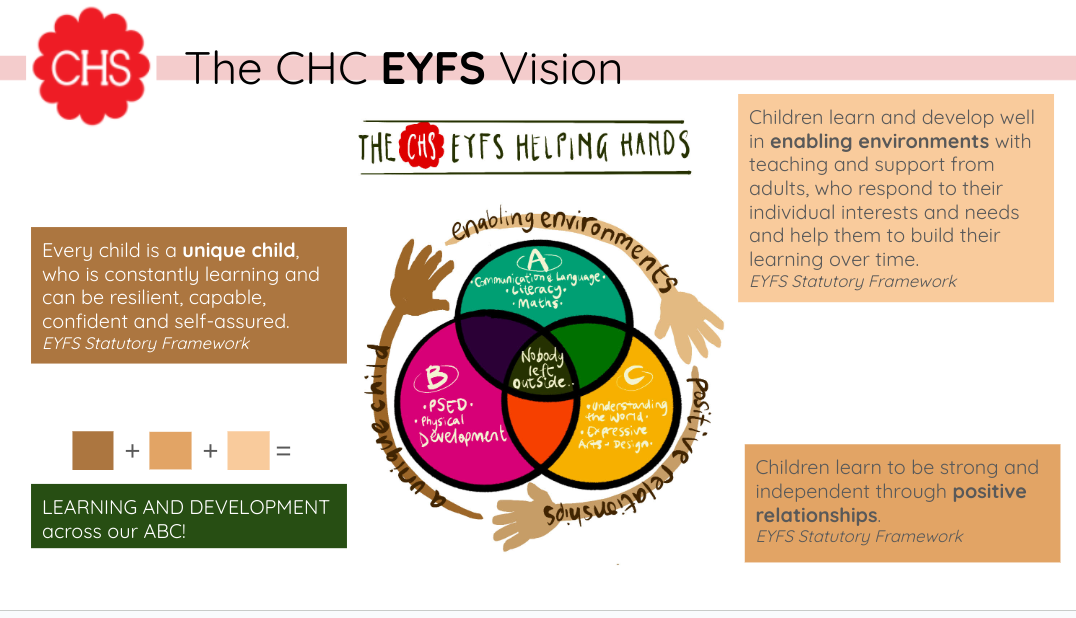- Home
- Teaching & Learning
- Foundation Stage
- Early Years Curriculum & Approach to Learning
Early Years Curriculum & Approach to Learning

Our focus in the Early Years on the Characteristics of Effective Learning enables us to prepare children for accessing their learning in Year 1 and beyond. We plan activities that foster engagement, motivation and creative thinking that equip children with the ability to be effective learners who are ready to develop their Academic, Being Me and Creative selves.
We offer an exciting and ambitious curriculum that is designed to equip all children with the skills they need to become lifelong learners. We use both child-initiated and adult-led play within a language-rich environment to ensure children gain the necessary knowledge and skills they will need as they continue their journey into KS1. We use Birth to Five Matters to support our curriculum and ensure that children are given the breadth of learning opportunities they need to succeed in all areas of their learning.
We know that children learn best when engaged in activities that are based on their interests. We make sure we build strong relationships that enable us to understand each child’s individual needs, and carefully plan as a team to ensure that both our indoor and outdoor environment provide opportunities to ignite their curiosity and fill their day with joy and excitement. We invite parents into school to share elements of their home culture and traditions, such as stories, dances and music. This is a wonderful opportunity for them to develop their understanding of the world and broaden their experience beyond their home and school environment.
We use a range of high quality texts during our topics that captivate children’s imaginations, develop a high level of vocabulary and help them build a rich inner world. We bring topics to life for our children by planning experiences that expand their knowledge of the world. During our Animals topic last year our Reception children loved watching eggs hatch into lively ducklings in our classroom and helped look after them in their first few weeks of life! They loved writing signs about how to look after ducklings, observed how they changed over time, and were able to see part of their life cycle first hand. All the children enjoyed telling visitors about the ducks which gave them an authentic reason to build their communication and language skills. These topics bring learning to life and most of the time the children don’t even realise they are learning; they are just having a brilliant time!
Our EYFS curriculum builds on the early experiences your child has had with you at home and teaches them the skills and knowledge as set out in the Early Years Foundation Stage framework. These seven areas of learning will give your child the foundations for good future progress through school and life.
The seven areas of learning are:
Communication and language:
We develop our children’s ability to express themselves and listen well by providing them with plenty of opportunities to communicate in a language rich environment, supported by highly trained staff who model and support children to express themselves effectively.
Physical development:
Physical development is fundamental to a child’s learning and development. Children will be exposed to a wide range of gross motor and fine motor activities, as well as being supported to understand the importance of keeping our bodies active.
Personal, social and emotional development: this crucial area of learning involves developing children’s sense of themselves, how they interact with others, and how they manage their feelings. /it is key to developing positive relationships and the confidence to explore the world around them with curiosity and resilience.
Literacy
Literacy involves developing children’s ability to create and communicate through the skills of reading and writing. We use the Talk for Writing approach which provides children with the vocabulary and understanding of story structure to become confident storytellers. We develop their phonetic knowledge quickly and effectively with daily phonics sessions, with lots of opportunities for them to apply their learning through their child initiated play.
Mathematics
Children develop their understanding of number, shapes and measures, and ability to apply this in a range of contexts, through a range of practical activities, games and songs.
Understanding the world
This involves how children make sense of the world around them, and is nurtured by providing opportunities to explore different communities, cultures, the environment and technology.
Expressive arts and design
Involves promoting self expression through a range of media, including dance, music and a range of materials. Children are encouraged to share their ideas and creativity.
Our environment
We understand the importance of fostering a learning environment where children feel safe, confident and motivated to engage in child-initiated play. We continually adapt our environment in line with children’s interests, utilising our indoor and outdoor learning spaces throughout the day. Children are able to access a wide range of areas and activities, including role-play, construction and sand/water play.
Assessment in EYFS
At the start of Nursery and Reception children undertake a baseline assessment in order for our team to understand their stages of development, strengths and needs. Our staff are confident with assessing necessary starting points using the information from the baseline assessments and are able to quickly recognise those who will need early intervention to enable them to reach their potential. They monitor progress and understanding regularly and tailor planning and next steps in learning in response. In Reception children complete the national ‘Reception baseline assessment’. This is a short, interactive and practical assessment of your child’s early literacy, communication, language and mathematics skills when they begin school, using materials that most children of your child’s age will be familiar with.



